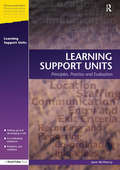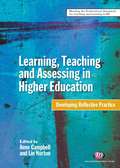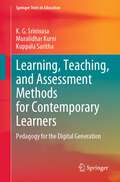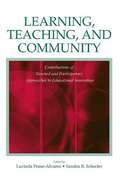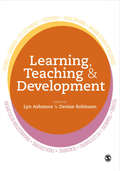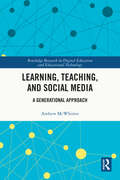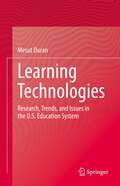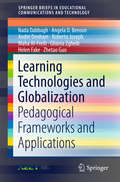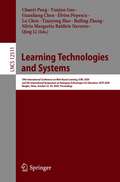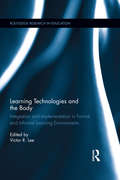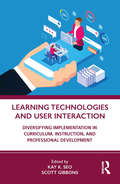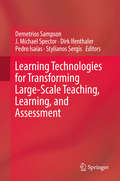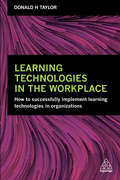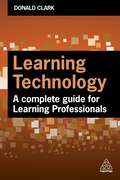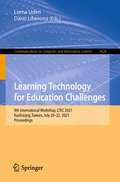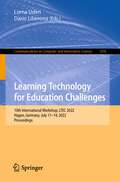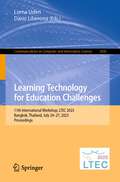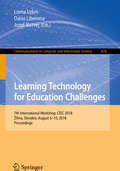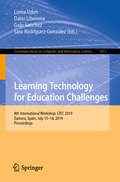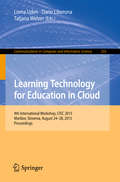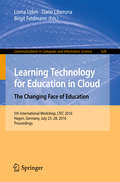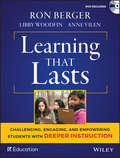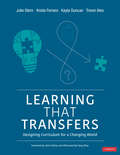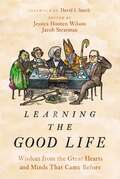- Table View
- List View
Learning Support Units: Principles, Practice and Evaluation
by Jane McSherryLearning support units (LSU) are an important piece in the jigsaw of educational and social inclusion. This book will help plan and run an effective LSU that is part of a whole school approach.
Learning, Teaching and Assessing in Higher Education: Developing Reflective Practice (Teaching in Higher Education Series)
by Anne Campbell Lin NortonThis is an up to date guide to teaching and learning in higher education, addressing issues raised by the Professional Standards Framework. It encourages the development of thoughtful, reflective teaching practitioners in higher education, and is useful for the review of existing courses. The authors and editors acknowledge the distinctive nature of teaching in higher education, explore a variety of creative and innovatory approaches, and promote reflective, inquiry-based and evaluatory approaches to teaching. The book supports the professional development of staff involved in teaching, supporting and assessing students.
Learning, Teaching, and Assessment Methods for Contemporary Learners: Pedagogy for the Digital Generation (Springer Texts in Education)
by K. G. Srinivasa Muralidhar Kurni Kuppala SarithaThis textbook tackles the matter of contemporary learners’ needs, and introduces modern learning, teaching, and assessment methods. It provides a deeper understanding of these methods so that the students and teachers can create teaching and learning opportunities for themselves and others. It explores the meaning of ‘pedagogy’, why it is essential, and how pedagogy has evolved to take 21st-century skills and learning into account. This textbook showcases various modern learning, teaching, and assessment methods for contemporary learners in an increasingly digital environment. Each chapter presents insights and case studies that show how such modern methods can be applied to classrooms, and how they can support the existing curriculum. It shows students, educators, and researchers alike how to effectively make sense of and use modern learning, teaching, and assessment methods in everyday practice.
Learning, Teaching, and Community: Contributions of Situated and Participatory Approaches to Educational Innovation
by Lucinda Pease-Alvarez and Sandra R. SchecterThis volume brings together established and new scholarly voices to explore how participatory and situated approaches to learning can contribute to educational innovation. The contributors' critical examinations of educational programming and engagements provide insights into how educators, youth, families, and community members understand and enact their commitments to diversity and equitable access. Collectively, these essays complicate notions of community, alerting readers to ways in which community can be constructed other than in geographical and ethnoracial terms--as alliances and collaborations of individuals joining together to accomplish or negotiate shared agendas. The focus on agency combined with social context, a dialectic to which all of the authors speak, enlarges and invigorates our sense of what is pedagogically possible in societies characterized by diversity and flux. *Part I, "Linking Pedagogy to Communities," focuses on dynamic initiatives where practitioners collaborate with community members and other professionals as they acknowledge and build on the cultural, linguistic, and intellectual resources of ethnic-minority students and their communities. *Part II, "Professional Learning for Diversity," centers on the authors' experiences in facilitating opportunities for working with prospective and practicing teachers to develop situated pedagogies, highlighting both the challenges that emerge and the transformations that occur. *Part III, "Learning in Community (and Community in Learning), illustrates how educational innovation can extend beyond the realm of schools and classrooms by elucidating ways in which individuals construct learning venues in out-of-school settings. Learning, Teaching, and Community: Contributions of Situated and Participatory Approaches to Educational Innovation is a compelling and timely text ideally suited for courses focused on teacher education and development, informal learning, equity and education, multilingual and multicultural education, language and culture, educational foundations, and school reform/educational restructuring, and will be equally of interest to faculty, researchers, and professionals in these areas.
Learning, Teaching and Development: Strategies for Action
by Denise Robinson Lyn AshmoreThis best practice guide to teaching in the Further Education and Skills sector, and professional organisational learning contexts, examines the key concepts underpinning effective teaching and learning and combines this with case studies which demonstrate meaningful connections between theory and practice. Each chapter also contains discussion questions, learning activities and reflective points, allowing you to further engage with key research and relate it to your own teaching. Offering pragmatic advice on learning design, support and delivery, coverage includes: Identifying learning needs and objectives Selecting and developing appropriate content Using technology to enhance learning Assessment, evaluation and reflection This is an indispensable resource for anyone preparing to teach in Further Education, current Higher Education lecturers and work-based learning trainers in private and public-sector organisations. Lyn Ashmore is a Senior Lecturer in the School of Education and Professional Development and Denise Robinson is Director of the Post Compulsory Education & Training Consortium, both are based at the University of Huddersfield.
Learning, Teaching, and Social Media: A Generational Approach (Routledge Research in Digital Education and Educational Technology)
by Andrew McWhirterEmploying a unique generational approach, this book critically assesses social media in educational contexts across all educational levels: from primary and secondary schools to further and higher education, proposing a schema for social media literacy (SML). Using research obtained from fieldwork observations conducted in online teaching groups, surveys, and in-depth interviews with teachers and educators on the topic of social media and education, chapters interrogate the historical relationship between educator and learner, and use the frame of expert methodology to understand what educators themselves consider important about social media and education relative to their sectors. Bringing together current literature from education, learning and media technologies, along with longstanding debates around technological influence, chapters also draw on audience and communication studies, psychology and arts and humanities at a time when many different disciplines are trying to understand what social media means to our society. This interdisciplinary volume will be of great interest to academics, researchers and postgraduates in the fields of technology in education, media literacy, and critical digital media. Practitioners involved in the sociology of education will also find the book of use.
Learning Technologies: Research, Trends, and Issues in the U.S. Education System
by Mesut DuranWith a historical context covering the past 20 years, this book provides in-depth discussions of research, trends, and issues related to learning technologies in K-12 schools, higher education settings, and educational administration in the U.S. Given the remote learning challenges and opportunities that the COVID-19 pandemic has recently brought to our attention, world-wide interest in educational technology-related issues is at its peak. Therefore, this book is specifically directed at the entire educational technology field, educators, educational leaders, researchers, and policymakers alike who are interested in learning technologies in the U.S. educational system.Three main resources guide the discussions in the book. First, an extensive literature review related to the book’s central focus—learning technologies in the U.S. education system, including relevant studies published over the last two decades-is presented. Second, reflections on the author's twenty years of professional teaching, research, and scholarship focused on educational technology at a major U.S. research university are provided. And third, the viewpoints of students in the graduate—level educational technology courses taught by the author, presenting the vital perspective of practicing teachers and educational leaders regarding how learning technologies affect their schools and their work within them, are considered. All of these perspectives and data combine to provide a comprehensive overview on the topic of learning technologies in the U.S. education system. Together, they create a book that is indispensable for anyone interested in learning technologies in education.
Learning Technologies and Globalization
by Nada Dabbagh Angela D. Benson André Denham Roberto Joseph Maha Al-Freih Ghania Zgheib Helen Fake Zhetao GuoThis brief describes the evolutionary and global impact of the techno-social transformation on learning technologies in terms of emerging pedagogical frameworks and applications. it provides examples of such applications in higher education, K-12, and the workplace, across the globe. The transformation and diffusion of ICT into an ever-present and accessible phenomenon is fundamentally shaping human activity and culture, changing human identity, and redefining globalization. Global activities have widened, intensified, and accelerated as a result of ICT integration generating a new awareness of the world as a techno-social environment. This emergent global environment is introducing unprecedented socio-economic opportunities; however, it is also bringing new risks and challenges, particularly as this relates to learning technologies, most especially in higher education contexts.
Learning Technologies and Systems: 19th International Conference on Web-Based Learning, ICWL 2020, and 5th International Symposium on Emerging Technologies for Education, SETE 2020, Ningbo, China, October 22–24, 2020, Proceedings (Lecture Notes in Computer Science #12511)
by Qing Li Elvira Popescu Yunjun Gao Lu Chen Tianyong Hao Chaoyi Pang Guanliang Chen Bailing Zhang Silvia Margarita Baldiris NavarroThis book constitutes the refereed conference proceedings of the 19th International Conference on Web-Based Learning, ICWL 2020, and 5th International Symposium on Emerging Technologies for Education, SETE 2020, held in Ningbo, China in October 2020.Together for the ICWL 2020 Conference and SETE 2020 Symposium 39 full papers were accepted together with 31 short papers out of 233 submissions. The papers focus on the following subjects: Semantic Web for E-Learning, through Learning Analytics, Computer-Supported Collaborative Learning, Assessment, Pedagogical Issues, E-learning Platforms, and Tools, to Mobile Learning and much more.
Learning Technologies and the Body: Integration and Implementation In Formal and Informal Learning Environments (Routledge Research in Education #135)
by Victor R. LeeThis volume explores how technology-supported learning environments can incorporate physical activity and interactive experiences in formal education. It presents cutting-edge research and design work on a new generation of "body-centric" technologies such as wearable body sensors, GPS tracking devices, interactive display surfaces, video game controller devices, and humanlike avatars. Contributors discuss how and why each of these technologies can be used in service of learning within K-12 classrooms and at home, in museums and online. Citing examples of empirical evidence and specific implementation, this timely and critical volume examines how body responsive technologies are being used within the educational community to advance the next generation of educational technology.
Learning Technologies and User Interaction: Diversifying Implementation in Curriculum, Instruction, and Professional Development
by Kay K. Seo Scott GibbonsLearning Technologies and User Interaction explores the complex interplay between educational technologies and those who rely on them to construct knowledge and develop skills. As learning and training continue to move onto digital platforms, tools such as artificial intelligence, predictive analytics, video games, virtual reality, and more hold considerable potential to foster advanced forms of synergy across contexts. Showcasing a variety of contributors who are attuned to today’s networked technologies, environments, and learning dynamics, this book is ideal for students and scholars of educational technology, instructional design, professional development, and research methods.
Learning Technologies for Transforming Large-Scale Teaching, Learning, and Assessment
by Dirk Ifenthaler J. Michael Spector Pedro Isaías Demetrios Sampson Stylianos SergisThis volume provides a contemporary glance at the drastically expanding field of delivering large-scale education to unprecedented numbers of learners. It compiles papers presented at the CELDA (Cognition and Exploratory Learning in the Digital Age) conference, which has a goal of continuing to address these challenges and promote the effective use of new tools and technologies to support teaching, learning and assessment. Given the emerging global trend to exploit the potential of existing digital technologies to improve the teaching, learning and assessment experiences for all learners in real-life contexts, this topic is a unifying theme for this volume.The book showcases how emerging educational technologies and innovative practices have been used to address core global educational challenges. It provides state-of-the-art insights and case studies of exploiting innovative learning technologies, including Massive Open Online Courses and educational data analytics, to address key global challenges spanning from online Teacher Education to large-scale coding competence development. This volume will be of interest to academics and professional practitioners working in the area of digital technology integration in teaching, learning and assessment, as well as those interested in specific conference themes (e.g., designing and assessing learning in online environments, assessing learning in complex domains) and presenters, invited speakers, and participants of the CELDA conference.
Learning Technologies in the Workplace: How to Successfully Implement Learning Technologies in Organizations
by Donald H TaylorKnowledge was once power - difficult to find, slow to transmit and coveted. Now we can access almost the sum total of human information with a swipe of our thumbs. The impact on the knowledge economy has been vast, leaving learning and development (L&D) professionals wondering how to keep pace. Many organizations naturally turn to technology to ensure workplace learning at scale and at speed, but stumble when it comes to successfully deploying and using it. Learning Technologies in the Workplace examines 16 years of learning technology implementations to find the secrets behind the most successful.Examples in the book from the Hershey Company and BP, airlines, tech companies and manufacturers point to four common factors. Successful learning technology teams all have APPA: a clear aim, a people focus, a wide perspective and a pragmatic, can-do attitude. Learning Technologies in the Workplace gives readers practical pointers for each of these four points, helping them implement and use learning technologies well, with particular emphasis on the essential skill of identifying stakeholders and winning their support.
Learning Technology: A Complete Guide for Learning Professionals
by Donald ClarkLearning technology is now an integral part of all learning and development (L&D) activity. Understanding what these technologies are, how they work and their aims is key to successful L&D practice. Learning Technology is written by a leading voice in the learning tech industry with over 35 years' experience. It explains the history of learning tech, its aims, its introduction to the workplace and the benefits to both the individual and the business. This book covers everything from online and mobile learning, simulations and gamification as well as detailed discussion of Learning Management Systems (LMSs), Learning Experience Platforms (LXPs) and Learning Record Stores (LRSs). This book also highlights the importance of data and analytics and covers the latest developments in the learning technology space including artificial intelligence, virtual reality and the metaverse. Most importantly, Learning Technology helps L&D professionals assess where their budget is best spent on technology and explains how to analyse the return on investment (ROI). Full of examples and practical advice throughout, this book also includes case studies from organizations including British Airways, UK National Health Service (NHS) and Learning Pool.
Learning Technology for Education Challenges: 9th International Workshop, LTEC 2021, Kaohsiung, Taiwan, July 20-22, 2021, Proceedings (Communications in Computer and Information Science #1428)
by Lorna Uden Dario LiberonaThis book constitutes the refereed proceedings of the 9th International Workshop on Learning Technology for Education Challenges, LTEC 2021, held in Kaohsiung, Taiwan, in July 2021. The 11 revised full papers and 6 short papers presented were carefully reviewed and selected from 83 submissions. The papers are organized in the following topical sections: learning tools and environment; e-learning and transferability strategies; serious games technologies; learning practices and knowledge transfer.
Learning Technology for Education Challenges: 10th International Workshop, LTEC 2022, Hagen, Germany, July 11–14, 2022, Proceedings (Communications in Computer and Information Science #1595)
by Lorna Uden Dario LiberonaThis book constitutes the refereed proceedings of the 10th International Workshop on Learning Technology for Education Challenges, LTEC 2022, held in Hagen, Germany, in July 2022. The 14 revised full papers and 6 short papers presented were carefully reviewed and selected from 41 submissions. The papers are organized in the following topical sections: learning methodologies and pandemic impact; learning practices and methodologies; learning technologies; learning technologies performance; serious games and virtual learning environments.
Learning Technology for Education Challenges: 11th International Workshop, LTEC 2023, Bangkok, Thailand, July 24–27, 2023, Proceedings (Communications in Computer and Information Science #1830)
by Lorna Uden Dario LiberonaThis book constitutes the refereed proceedings of the International Workshop on Learning Technology for Education Challenges, LTEC 2023, held in Bangkok, Thailand, during July 24–27, 2023.The 27 full papers included in this book were carefully reviewed and selected from 53 submissions. They were organized in topical sections as follows: serious games and virtual learning environments; learning practices and methodologies; learning technologies; learning mehtodologies and models; learning technologies performance.
Learning Technology for Education Challenges: 7th International Workshop, LTEC 2018, Žilina, Slovakia, August 6–10, 2018, Proceedings (Communications in Computer and Information Science #870)
by Lorna Uden Dario Liberona Jozef RistvejThis book constitutes the refereed proceedings of the 7th International Workshop on Learning Technology for Education Challenges, LTEC 2018, held in Žilina, Slovakia, in August 2018. The 25 revised full papers presented were carefully reviewed and selected from 54 submissions. The papers are organized in the following topical sections: Gamification and learning; learning and knowledge transfer; learning technologies applications; virtual learning environments; and mobile learning and MOOCs. LTEC 2018 examines how these technologies and pedagogical advances can be used to change the way teachers teach and students learn, while giving special emphasis to the pedagogically effective ways we can harness these new technologies in education.
Learning Technology for Education Challenges: 8th International Workshop, LTEC 2019, Zamora, Spain, July 15–18, 2019, Proceedings (Communications in Computer and Information Science #1011)
by Lorna Uden Dario Liberona Galo Sanchez Sara Rodríguez-GonzálezThis book constitutes the refereed proceedings of the 8th International Workshop on Learning Technology for Education Challenges, LTEC 2019, held in Zamora, Spain, in July 2019.The 41 revised full papers presented were carefully reviewed and selected from 83 submissions. The papers are organized in the following topical sections: learning technolgies; learning tools and environment; e-learning and MOOCs; learning practices; social media learning tools; machine learning and evaluation support programs. LTEC 2019 examines how these technologies and pedagogical advances can be used to change the way teachers teach and students learn, while giving special emphasis to the pedagogically effective ways we can harness these new technologies in education.
Learning Technology for Education in Cloud
by Lorna Uden Dario Liberona Tatjana WelzerThis book constitutes the refereed proceedings of the Fourth International Workshop on Learning Technology for Education in Cloud, LTEC 2015, held in Maribor, Slovenia, in August 2015. The 24 revised full papers presented were carefully reviewed and selected from 46 submissions. The papers cover various aspects of technologies for learning, such as MOOC challenges; cooperative learning; learning engineering; learning tools and environments; STEM.
Learning Technology for Education in Cloud - The Changing Face of Education
by Lorna Uden Dario Liberona Birgit FeldmannThis book constitutes the refereed proceedings of the 5th International Workshop on Learning Technology for Education in Cloud, LTEC 2016, held in Maribor, Slovenia, in July 2016. The 25 revised full papers presented were carefully reviewed and selected from 51 submissions. The papers are organized in topical sections on learning technologies; learning tools and environment; MOOC for learning; problem solving and knowledge transfer; case study.
Learning That Lasts: Challenging, Engaging, and Empowering Students with Deeper Instruction
by Jal Mehta Ron Berger Libby Woodfin Anne VilenA practical guide to deeper instruction--a framework for challenging, engaging, and empowering students of all ages For schools to meet ambitious new standards and prepare all students for college, careers, and life, research has shown unequivocally that nothing is more important that the quality of daily instruction. Learning That Lasts presents a new vision for classroom instruction that sharpens and deepens the quality of lessons in all subject areas. It is the opposite of a 'teacher-proof' solution. Instead, it is predicated on a model of instruction that honors teachers as creative and expert planners of learning experiences for their students and who wish to continuously grow in their instructional and content knowledge. It is not a theoretical vision. It is a model of instruction refined in some of the nation's most successful public schools--schools that are beating the odds to create remarkable achievement--sited primarily in urban and rural low-income communities. Using case studies and examples of powerful learning at all grade levels and in all disciplines, Learning That Lasts is a guide to creating classrooms that promote deeper understanding, higher order thinking, and student independence. Through text and companion videos, readers will enter inspiring classrooms where students go beyond basics to become innovators, collaborators, and creators. Learning That Lasts embraces a three-dimensional view of student achievement that includes mastery of knowledge and skills, character, and high-quality work. It is a guide for teachers who wish to make learning more meaningful, memorable, and connected to life, and inspire students to do more than they think possible.
Learning That Transfers: Designing Curriculum for a Changing World (Corwin Teaching Essentials)
by Julie Stern Krista Ferraro Kayla Duncan Trevor Aleo"It is a pleasure to have a full length treatise on this most important topic, and may this focus on transfer become much more debated, taught, and valued in our schools." - John Hattie Teach students to use their learning to unlock new situations. How do you prepare your students for a future that you can’t see? And how do you do it without exhausting yourself? Teachers need a framework that allows them to keep pace with our rapidly changing world without having to overhaul everything they do. Learning That Transfers empowers teachers and curriculum designers alike to harness the critical concepts of traditional disciplines while building students’ capacity to navigate, interpret, and transfer their learning to solve novel and complex modern problems. Using a backwards design approach, this hands-on guide walks teachers step-by-step through the process of identifying curricular goals, establishing assessment targets, and planning curriculum and instruction that facilitates the transfer of learning to new and challenging situations. Key features include Thinking prompts to spur reflection and inform curricular planning and design. Next-day strategies that offer tips for practical, immediate action in the classroom. Design steps that outline critical moments in creating curriculum for learning that transfers. Links to case studies, discipline-specific examples, and podcast interviews with educators. A companion website that hosts templates, planning guides, and flexible options for adapting current curriculum documents. Using a framework that combines standards and the best available research on how we learn, design curriculum and instruction that prepares your students to meet the challenges of an uncertain future, while addressing the unique needs of your school community.
Learning That Transfers: Designing Curriculum for a Changing World (Corwin Teaching Essentials)
by Julie Stern Krista Ferraro Kayla Duncan Trevor Aleo"It is a pleasure to have a full length treatise on this most important topic, and may this focus on transfer become much more debated, taught, and valued in our schools." - John Hattie Teach students to use their learning to unlock new situations. How do you prepare your students for a future that you can’t see? And how do you do it without exhausting yourself? Teachers need a framework that allows them to keep pace with our rapidly changing world without having to overhaul everything they do. Learning That Transfers empowers teachers and curriculum designers alike to harness the critical concepts of traditional disciplines while building students’ capacity to navigate, interpret, and transfer their learning to solve novel and complex modern problems. Using a backwards design approach, this hands-on guide walks teachers step-by-step through the process of identifying curricular goals, establishing assessment targets, and planning curriculum and instruction that facilitates the transfer of learning to new and challenging situations. Key features include Thinking prompts to spur reflection and inform curricular planning and design. Next-day strategies that offer tips for practical, immediate action in the classroom. Design steps that outline critical moments in creating curriculum for learning that transfers. Links to case studies, discipline-specific examples, and podcast interviews with educators. A companion website that hosts templates, planning guides, and flexible options for adapting current curriculum documents. Using a framework that combines standards and the best available research on how we learn, design curriculum and instruction that prepares your students to meet the challenges of an uncertain future, while addressing the unique needs of your school community.
Learning the Good Life: Wisdom from the Great Hearts and Minds That Came Before
by Jessica Hooten Wilson Jacob StratmanDiscover the Good Life as You Learn from the Wise Voices of the PastWe've lost ourselves. Disconnected from the past and uncertain about the future, we are anxious about what our lives will be and troubled by a nagging sense of meaninglessness. Adrift in the world, many Christians have their identity completely wrapped up in work and their definition of the "good life" is financial success. Fewer of are staying committed to the Christian faith, finding it difficult to reconcile their experience with their longings and desires. With so much uncertainty, where can we find a true vision of "the Good Life"?Learning the Good Life speaks to this malaise with trusted and assured voices from the past, inviting Christians into an age-old conversation with some of history's wisest hearts and minds as their dialogue companions. Featuring classic writings from a diverse lineup of over 35 writers and thinkers including Confucius, Augustine, Sor Juana Inés de la Cruz, W.E.B. DuBois, Flannery O'Connor, and Wendell Berry. Together these sages of the past address important issues such as:VocationCallingMeaningSufferingBeautyVirtueLearningWisdomCritical ThinkingCommunityWonderReflectionAnd moreEach of these texts are introduced by experts who are teachers, from a variety of Christian colleges and universities, to help providing a broader, richer, and more cohesive narrative in which Christians may participate. In addition to a substantive introduction, each text is accompanied by discussion questions to provoke further thought and contemplation and also to facilitate discussion when used in groups. Ideal for any Christian seeking a deeper connection to the wisdom of the past and wanting a more cohesive and beautiful vision of the good life. All the writers have a message for you. All of them are calling you to die to yourself, to your habits of indulgence, to your pride and ambition, and instead, dedicate your time to learning, thinking, and loving.Writers and writings featured in Learning the Good Life include:Lao Tzu, From Tao Te ChingConfucius, SelectionsPlato, The Allegory of the CaveSeneca the Younger, "On the Shortness of Life"Athanasius, On the IncarnationGregory of Nazianzus, On My Own VersesAugustine, On the TeacherAugustine, On Christian Doctrine, Book I.Pope Gregory the Great, Life of Saint Benedict, Dialogues, Book 2Dante Alighieri, The Divine Comedy, Inferno 1Nezahualcoyotl, "A Flower Song of Nezahualcoyotl"Margery Kempe, From "The Book of Margery Kempe"William Shakespeare, King LearJohn Amos Comenius, From The Labyrinth of the World and the Paradise of the HeartGeorge Herbert, Five PoemsBlaise Pascal, SelectionsMatsuo Basho, Three Haiku PoemsSor Juana Ines de la Cruz, "Respuesta a Sor Filotea de la Cruz"John Milton, AreopagiticaJonathan Edwards, "Personal Narrative"Edmund Burke, Reflections on the Revolution in FranceLord Alfred Tennyson, "Ulysses"Frederick Douglass, Narrative LifeElizabeth Barrett Browning, from Aurora LeighHenry David Thoreau, "Life Without Principle"Gerard Manley Hopkins, "As Kingfishers Catch
